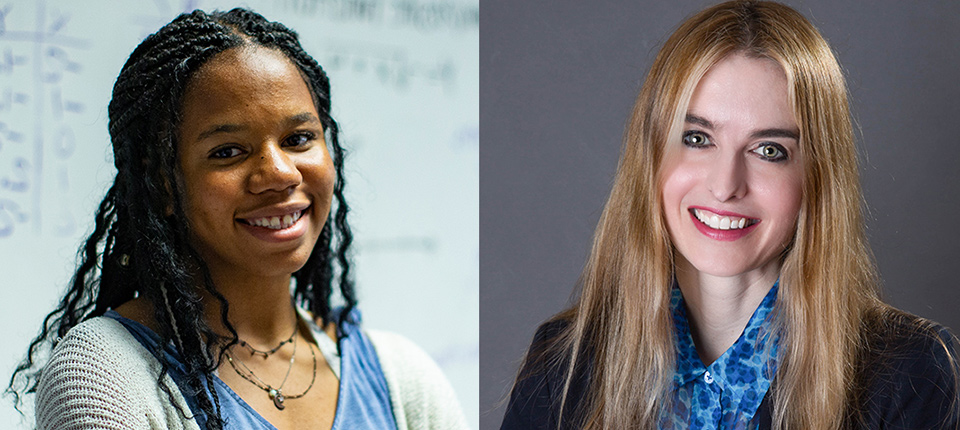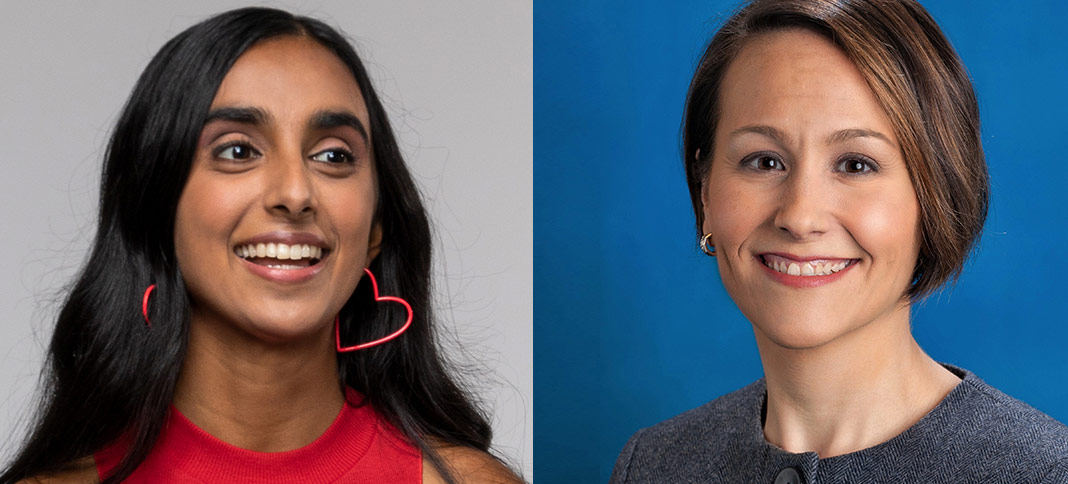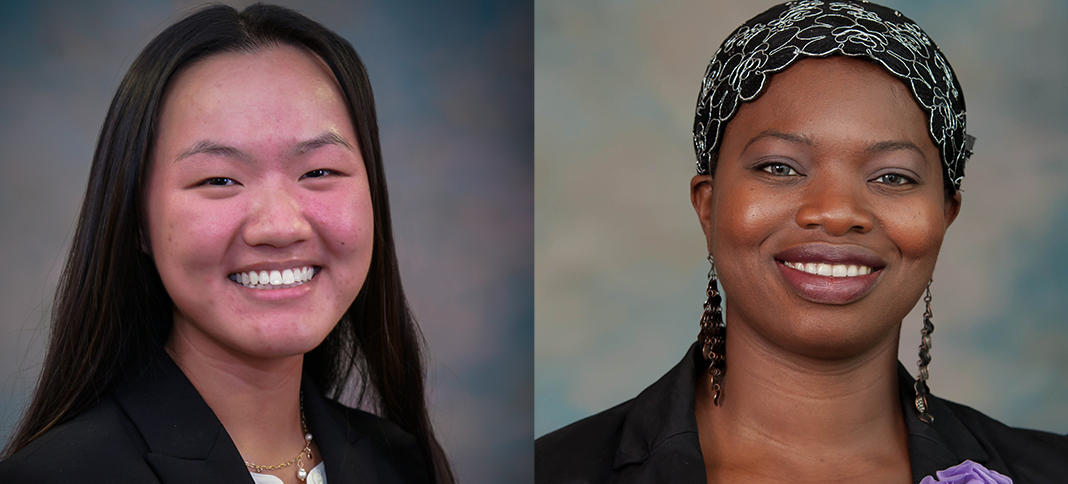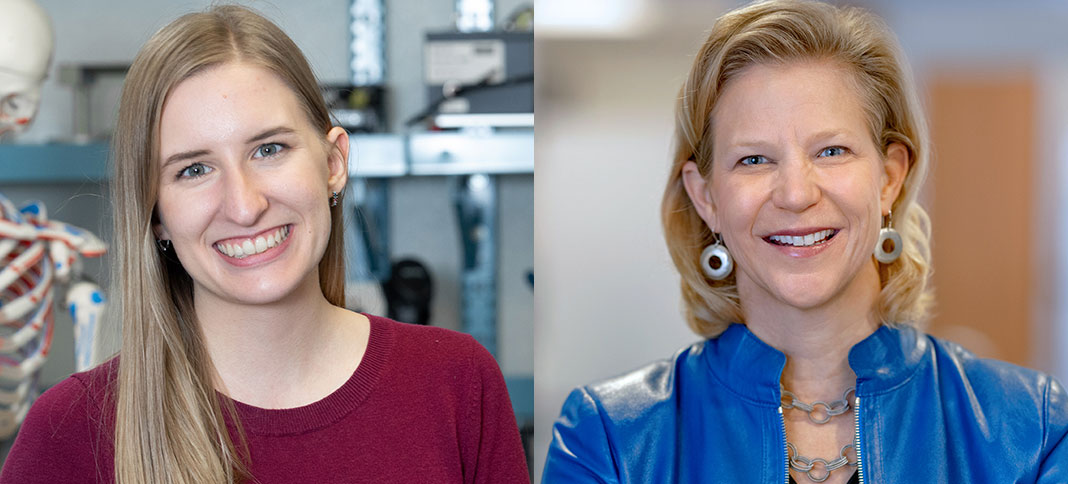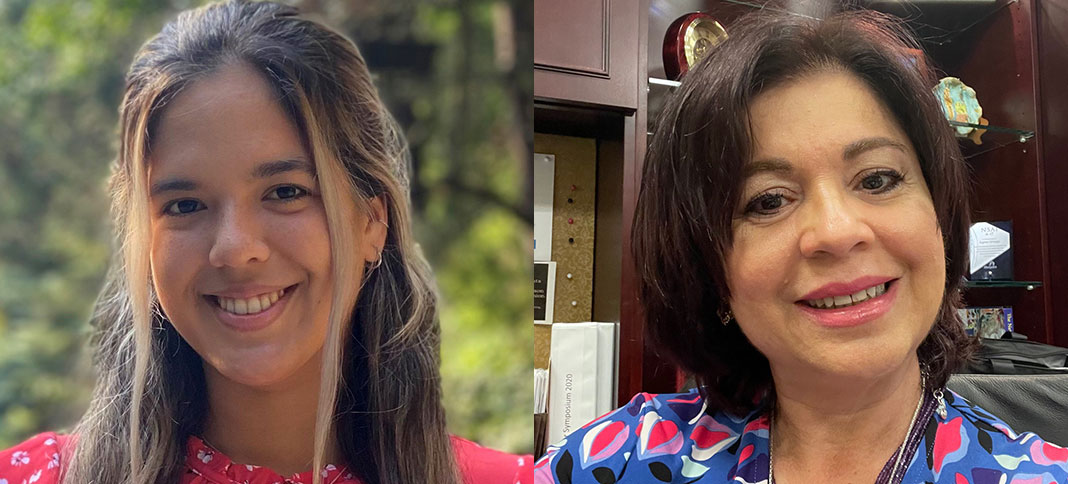
Podcast: How to Navigate Change in the STEM Fields
Abbott's Agnes Ortega and engineering intern Ixchelle Hernández Lebrón discuss navigating STEM careers amid a new culture.
Dec. 16, 2021
- Copy Link
- Share on X
- Share on Facebook
- Share on Linkedin
In this edition of Shaping the Future of STEM, college intern Ixchelle Hernández Lebrón interviews Agnes Ortega, divisional vice president of Global Compliance and Quality Operations at Abbott. Listen as Agnes and Ixchelle discuss navigating a STEM career amid a new culture, the similarities between engineering and art and leadership lessons for women.
Ixchelle, who is earning her chemical engineering degree at the University of Puerto Rico, is the latest host on Shaping the Future of STEM. Every podcast episode features different female Abbott high school and college interns as they interview female Abbott STEM professionals from across the company. As a global health technology company committed to providing opportunities for students in science, technology, engineering and math, we offer opportunities around the world including our award-winning high school and college internship programs.
READ THE TRANSCRIPT:
Ixchelle: Hello, everyone, and welcome, my name is Ixchelle Hernández , and I’m this episode’s host and interviewer. I’ve completed four summer internships with Abbott. I just earned my bachelor’s degree of science in chemical engineering at the University of Puerto Rico. And I’ll soon be joining the Abbott Professional Development program. I’m so happy to be here today with another University of Puerto Rico graduate, Agnes Ortega. Thank you so much for being with us, Agnes.
Agnes: Hi, it is my pleasure, Ixchelle. Great for being here with you.
Ixchelle: Thank you. So Agnes, I know you have a vast background with experiences in different companies and in different roles. Can you share with us how you came upon Abbott?
Agnes: Absolutely. Actually, that’s a great question because I love to speak about Abbott. Abbott is the perfect place for me. Just summarizing, it is the perfect place for me. There is a direct match between the values that we display at Abbott, and our and the values that I consider important in my life, particularly being so customer centric. The other aspect that I simply enjoy a lot from working at Abbott is the science, the best variety and diversity of the products that we make, and how much good we do two people globally. And as I said, has, it’s been a dream come true since May 2014, when I joined Abbott.
Ixchelle: Nice. That's awesome. As you know, I just completed my degree in chemical engineering, and it feels a little bit unreal. I remember so clearly the day I applied to the University of Puerto Rico and I remember feeling so nervous about it. I was a high school student and I needed to choose my interest as a teenager. I was actually very interested in the creative arts. I like to draw, and I love to knit and I love to crochet. But believe it or not, that is the kind of, kind of the reason I chose engineering. Engineering is by its very nature a creative profession. A couple years later, I can say I found myself multiple times in positions where I need to explore, invent and create in order to solve a problem, which are exactly the steps I take every time I draw or I knit or crochet. So you also have a degree in science. So Agnes, can you tell us when did your interest in STEM fields begin?
Agnes: Well, like you, Ixchelle, if I go back in memory since I was a little kid, I was always interested in science. But the truth is that I also love arts. So I agree with you, I think there is a little bit of being a renaissance person in us when we’re interested in science. And I, I have to think that is because we like to stay curious. Curiosity is an innate characteristic of individuals that love to get into science. And when I was little – now Ixchelle, I’m going to disclose here my age, so bear with me, OK? – I used to read the encyclopedia, OK? That was my hobby. That was one of my hobbies. I wanted to learn about something and I just looked through the encyclopedia on that particular topic. Well, today I Google things, right, a little bit advantageous. And also, I remember, Ixchelle, my gifts when I was growing up were very different. When I was eight years old, I asked my aunt to give me a microscope. I asked Santa, right, at my aunt’s house, to give me a microscope as a gift. I was only eight. But I also remember asking my mother to give me "Don Quixote," like, as a gift, you know what I read when I was 10 years old. Now, I'm not a genius, by any stretch of imagination. I was just surrounded by books. My aunt, the lady that I referred to that gave me that microscope as a gift, she owned a clinical lab in one of our small towns in Puerto Rico. When I visited her at that lab, for me it literally was like getting into Disneyworld. I enjoy it even more than that. I, of course, I couldn't understand anything that was going on. But the, even the smell of the of the reagents, and everything was so important to me, so appealing to me. So that’s how I came about it. I knew when I started when I went to college, I knew that I was going to get into any kind of field associated with science.
Ixchelle: Thank you. That’s amazing. Now and I know that after graduating, you started your career in Puerto Rico. But I also know that your current role is based in Abbott headquarters, which is an Illinois. So can you please tell us a little bit about your transition from Puerto Rico to the mainland United States?
Agnes: Oh well, Ixchelle. It was really hard. OK, I was born and raised in Puerto Rico, right, my entire life. When I moved, I already had north of 20 years or so in the industry. So I was an adult, a very mature adult, when I moved from our tropical island into Massachusetts. OK, so for starters, it was a thermal shock.
Ixchelle: For sure.
Agnes: And that was that was 15 years ago. So it was indeed a thermal shock, but also culturally, very, very different. Look, the day I discovered that hugging people wasn’t a universal way of saying good morning, was another shock. As a fellow Puerto Rican, you know what I’m talking about, and probably for people listening to us from different cultures. And please don’t take me wrong, I greatly appreciate it. I enjoyed the diversity and but it was important for me to pause and learn about that difference so that I could come across, right. I came, I joined AstraZeneca at that time, back in, 15 years ago as a senior director role. So I needed to come, be able to come through, be able to connect the right way with members of my team. And if hugging was going to be a problem, of course, I needed to adapt. So it was different, but it was something that made me grow tremendously, that allowed me to value and appreciate the circumstances. They were extremely patient with me. So the other thing, Ixchelle, that was very different. You know, working for pharma industry and medical, in medical healthcare industry, for as I said, 20 years in Puerto Rico, business was conducted in English. So I didn’t have any problems to write a very formal memo or a technical report, or even to communicate in a presentation in a very effective way. But when I started to speak from the heart, I stumble with words, because my, my native language and when I speak from the heart, it comes across in Spanish. So that was another area that I had to adapt, that I had to learn. And look, I am very grateful about the people that were around me, because the patience that they displayed, made a whole difference. So that’s why I think we owe that to others, right.
Ixchelle: Thank you, thank you so much. And I feel, I feel somehow connected with you, in that sense, you know, as soon to be also a full time, a full timer at Abbott. Now, I’ll be moving to mainland United States too, so I definitely feel connected, you know. As a born and raised, Puerto Rican, just like you, one of the most important things for me is my culture. And that includes my Spanish, of course. And, you know, moving away from one’s community can be really scary, a little bit scary. So do you have any advice for me, and for those who find themselves or soon will be in that same path?
Agnes: I do, Ixchelle. And, as I said, I owe that as part of my journey to our colleagues and people around us. Look, the first thing to acknowledge is, it is a very personal journey. Everyone is very individual, is going to be very specific. Some people are going to have some challenges and others are going to have different challenges. But I will gladly and humbly share what I think was the key for my success. And it wasn’t easy at the beginning. But the key for my success was to truly genuinely embrace my uniqueness. Accept that it is OK to be different. Don’t be afraid to talk with an accent. I do have an accent. You don’t have an accent, Ixchelle. I don’t know, where do you learn your English? I do have an accent. And if you were to speak with my children, they didn’t, right, because it’s generational. But I embraced it. And once I reconciled that in my mind and in my heart, it freed me to be myself. It allowed me to truly contribute. Because I did brought a wealth of knowledge, technically speaking, and I couldn’t, I couldn’t permit these differences to be a blocker, an inhibitor, for me to, to bring the best of me every day, to put myself out there, to learn. So again, my advice to everybody, no matter your differences, no matter your color, even if you’re from – you, look, look, the United States as a vast differences between territories. We’re different from the South, the North, the West, East, right. Embrace that difference, that uniqueness. Actually see the beauty of that diversity, because that’s the way we work at Abbott. That’s who we are at Abbott. That is a true reflection of who we are globally. We have, I have, members of my team, Ixchelle, that are based in India, which I appreciate tremendously in Latin America, in many parts of Europe, you know. So, we are a composition of very different people from different cultures, from different geographies, from different backgrounds, from different mindsets and technical knowledge. So once you embrace that, it’s, it’s really the, in my opinion, my humble opinion, the key to success.
Ixchelle: Thank you. I’ll definitely take that advice with me, for, I think, the rest of my career. Thank you so much, Agnes. So Agnes, I know that you have a background in science and many other professional experiences. Like you mentioned that you worked in AstraZeneca and now you’ve been working as divisional vice president of Global Compliance and Quality Operations for Abbott. Can you tell us about the professional qualification you’ve obtained and how it has helped you personally?
Agnes: Well, what immediately comes to mind is that 26 years ago, OK, I attended a two-week long root cause analysis seminar, and I was still living in Puerto Rico. Yes, I was still living in Puerto Rico. It was held in Princeton, New Jersey. My oldest son was only a year old. And well, you can imagine, and for those that are listening to our conversation today, especially those young mothers can relate to how hard it is to leave your little kid, you know. But you know, as a new mom, it was very nerve racking to leave my son for two weeks, consecutive two weeks, and go to the seminar. I mean, those two weeks were a great investment. They were a sacrifice. They came in a time in my life, my personal life, that was difficult. But they had paid back tremendously. I use those tools that I acquired today. So my advice is, find these type of things that you know, that will equip you, this type of training, this type of seminars, this, this type of. You know, today, we have access to virtual trainings. We may not even have to leave our homes to get this, but remain open to these type of tools that are out there that perhaps are useful for the rest of your career and even your life. I apply a lot of that thinking in my personal life as well.
Ixchelle: I believe that. Yeah, that reminds me a lot about, you know, even on my internships, I think those are concepts that I had to apply or concepts that, you know, would have helped me get, to complete my summer internship projects or helped me complete my summer internship project. So definitely thank you. That’s awesome. Could you please share with us the name of a woman who has inspired you the most and why?
Agnes: I love this question. I do. Her name is Norma Voorheis. She’s one of the first Puerto Rican women to complete a bachelor’s degree at University of Puerto Rico in Río Piedras back in the 1940s. She was first generation of college graduate in her— graduates in her family. She raised two daughters by herself as a single mother. And although she wasn’t wealthy, she provided them with the best education that she could have provided under her means, sending them to one of the best private schools in Puerto Rico, at that time. One is in the science field, one of those daughters, the other is a journalist. They’re both very successful. Her grandchildren are all professionals who graduated from the best schools in mainland USA, some of which are Ivy Leagues and I know she lives very proud of her grandchildren. She was a true class act lady, or she is a true class act lady, very elegant, very sophisticated. Unfortunately, at age of 83, she’s suffering from senile dementia and is not the same person that used to be in the 40s when she went to school. This woman is my mother.
Ixchelle: That’s amazing. Her name is Norma?
Agnes: Norma Voorheis. But I’m extremely proud of her. And she is the true role model for me, for my sister, and for all the generations that succeeded.
Ixchelle: Thank you. Thank you, Agnes, for sharing that. As a woman in engineering, and soon to be full time employee at Abbott, this next question is really important for me. What’s a leadership lesson that you’ve learned that’s unique to being a female leader?
Agnes: Don’t let anything erode your confidence. I learned that. And I learned it probably the hard way. Because I did experience moments where I lack confidence in myself. Look, we all face moments of doubting. And then it could be, especially if you’re putting yourself in a stress situation where you’re embarking into a new role, you’re doing something that is in a, in a new job, or something that is completely new technology for you. That is normal. It’s OK to recognize that this is new territory. But what we cannot do, especially female, is let anything or anyone, question our capability, to the point where we will then consider that we don’t have the skills or the experience to do what we need to do. And the thing that really helped me personally, was to remember my journey. When I felt that my confidence was being lost, that I was thinking, ‘Oh, I cannot do this.’ I go back, I went back and I remembered all the things that I was able to accomplish. All the things, all the new things that I was able to learn. How I, by asking questions, by becoming studious, as I said, was able to embark in completely new roles. And that gave me the reassurance that ‘Yes, I can do this again.’ When I look back, my confidence was regained. And I also like to use allies. It’s very important to have people around you that help you speak truth to you. There may be areas in which you’re not really mastering it. And it’s important to have the right allies that will, that will serve as that sounding board, as that individual that you can trust. Find a mentor. Find a sponsor. Get together frequently with these individuals that really care for your growth. But do not anything erode your confidence.
Ixchelle: So, thank you so much, Agnes. I agree with that 100%. And I think that’s one of the reasons Abbott is so special to me. It’s because I’ve been able to find those allies, those mentors for all of these four summers that I’ve been with Abbott. I’ve had people that support me and that believe in me and that remind me that I am capable and remind me that I can be a future female leader at Abbott too. So thank you and thank you so much, Agnes for being here today. I am so happy I got to know a little bit more about you and your career at Abbott. Before we go though, I have one final question for you. It’s a question that we always make at the end of our episodes here at Shaping the Future of STEM. So would you rather build snow forts or snow— or sand castles?
Agnes: Oh, that’s a great question. What do you think is going to be my answer coming from a tropical island? Well, I got to tell you, being at the beach is my happy place. So I absolutely will prefer to build sand castles. Having said that though, sometimes I’m forced to build snow forts. Because I live in Chicago. I lived for many years in Massachusetts. So snow is around us. So I love the four seasons. But absolutely, the beach is my happy place.
Ixchelle: Definitely. Definitely. I relate to that too. And I’ve only seen snow like twice in my life. So I don’t have a lot of experience with snow. So I think I would also choose to build sandcastles, that way it can show off my sandcastle building skills.
Agnes: Yeah, and I would like to invite you maybe next winter, you can come and visit with me here in Chicago and have some experience with that snow.
Ixchelle: Thank you. Thank you, Agnes.
Agnes: Yes, and thank you Ixchelle, for the privilege of this opportunity to get to know you better and this conversation, I appreciate it.
For more stories and advice from Abbott’s female STEM interns and experts, check out our Shaping the Future of STEM episodes wherever you get your podcasts.
Related articles
-
Strategy and Strength
Podcast: How to Find STEM Success? Learn to Pivot.
Neuroscientist Beth McQuiston talks with intern Jomi Babatunde-Omoya about how flexibility builds career success.
-
Strategy and Strength
Podcast: How to Find Support When You're Studying STEM
Abbott intern Diya Iyer talks with Betsy Wille about how to find support when you're studying STEM subjects.
-
Strategy and Strength
Podcast: How to Turn STEM Curiosity Into a Career
Microbiologist Zaina Bawa-Mamudu talks with an Abbott intern about mentoring, diversity and curiosity.
-
Strategy and Strength
Podcast: How Confidence Can Open Doors in STEM
Lisa Earnhardt – the head of Abbott's Medical Devices division – discusses finding your authentic self with intern Stephanie Slowik.
For the latest on Abbott’s life-changing technology, get updates directly in your inbox.

